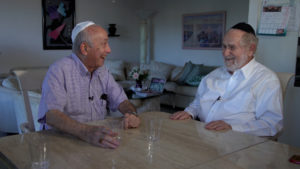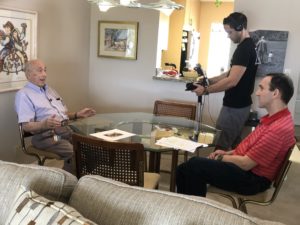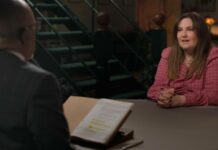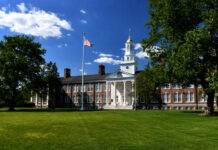
A New-Jersey based journalist and Holocaust survivor have teamed up to show their audiences that “Hitler did not win”.
Fred Behrend, 95, and his family fled from Germany to Cuba after Kristalnacht before coming to the U.S. in 1940, leaving behind Behrend’s close friend Henry (Heinz) Baum.
Eighty years after the Night of Broken Glass, nearly to the day, Behrend, with the help of journalist Larry Hanover, reunited with Baum.
“It was like the years melted away at the moment the doors opened,” Hanover said. “It was like they were acting like 12-year-old kids again. It was unbelievable.”
The reunion, to Behrend, was representative of the survival of the Jewish people, a triumph against the odds. Hanover tells the story of Behrend’s and Baum’s survival and reunion in his documentary “Rebuilt from Broken Glass,” which premiered on May 17.
Vorhees resident Hanover first met Behrend in 2010, when Behrend spoke in front of Hanover’s son’s Hebrew high school class at Congregation Beth El. He was struck by Behrend’s story.
“I used to be a newspaper reporter ’till a few years before that, and I was missing the chance to write,” Hanover said. “And I’m like, ‘Listen, why hasn’t he written a book?’ And so after that, we met, and I talked him into writing.”
The two worked on a book recounting Behrend’s time in Nazi Germany and his eventual escape to the United States. The book, “Rebuilt from Broken Glass: A German Jewish Life Remade in America” was published by Purdue University Press in 2017.
Behrend continued to spend time speaking to young people about his story, and in 2018, it became apparent to Hanover that the history recorded in Behrend’s book was still being written.
While talking to a Jewish day school in Cherry Hill on the 80th anniversary of Kristallnacht, Behrend was handed a cell phone by the head of the school. Behrend heard Baum’s voice on the other end, for the first time in almost 80 years.
“I couldn’t believe it,” Behrend said.
The next year, in 2019, Behrend, Hanover, and a small documentary crew traveled to Florida, where Baum lives and where, coincidentally, Behrend spent his winters just 16 miles away.
When the two survivors reunited, awkward formalities were forgotten as the two met each other again with childlike wonder.
“He introduced himself as ‘Professor Baum,’” Behrend said of the reunion. “When we were in school together, you were such a dumb kid! How did you manage to become a professor?”
Though the friends’ reunion was joyful, their first meeting was under more challenging circumstances.
Behrend, born Fritz Behrend in November 1926, grew up on an estate originally owned by the Zeppelin family in Germany. He remembers having a normal childhood until Hitler rose to power in 1933.

“All of a sudden, I had no kids to play with,” Behrend said. “As a matter of fact, my parents did not allow me on the streets because they were afraid that something would happen to me.”
After only three years in public school under the Third Reich, Behrend was forced out of school in 1937. In order to continue his education at a Jewish school, his family sent him to Cologne, where he was sent to live with a hazzan and his family, including two children, Margot and Henry Baum.
Less than two years later, on Nov. 9, 1938, Behrend and Baum witnessed their school and two synagogues engulfed in flames.
At first, not knowing the context of the fire, Behrend reacted in the way many children would: “Would you believe this was the greatest moment in my life?…Can you picture? No school; no homework; no teachers!”
But the reality of the looming Holocaust was never far from Behrend’s family. Unbeknownst to Behrend at the time, stormtroopers came to his family’s home the night before, kidnapping his father and taking him to Sachsenhausen concentration camp, where he stayed for a short time, along with the lucky few Jews able to leave a concentration camp prior to the declaration of World War II. He was released under the condition that his family leave the country immediately.
With the help of his mother’s brother, who was very wealthy, the Behrend family secured $7,500 deposits for the Behrend family and three others — worth over $600,000 today — to fund a new life in America.
The family spent a year-and-a-half in Cuba as a place of refuge before they were allowed to enter the U.S. Behrend became a bar mitzvah there, in front of a congregation of 20 people, each of whom were responsible for bringing their own food to the party.
In 1945, Behrend was drafted into the U.S. military, where, in a turn of fate, he was part of the Intellectual Diversion denazification program, where he reeducated German prisoners of war on democracy.
Behrend later became a television mechanic, claiming to be one of the best.
“The beauty of his story is this optimistic personality…and he kept having these collisions with history,” Hanover said of Behrend’s life. “It was like he was a magnet for it.”






